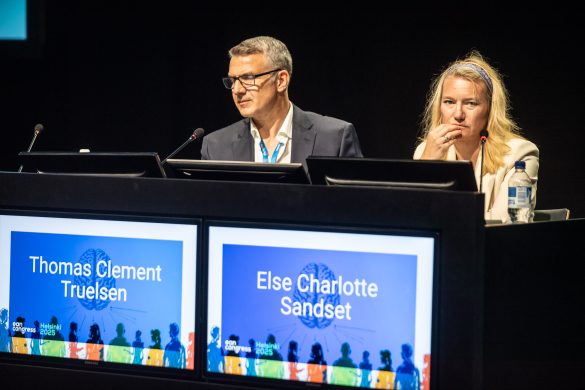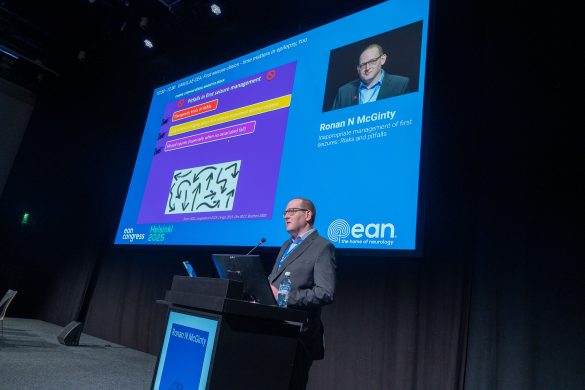by Isabella Colonna
The session ‘Personalized palliative care for chronic progressive neurological disease’ was held in co-operation with the European Association for Palliative Care and focused on the role of palliative care in neurological disorders.
The first lecture was ‘Advancing precision care in advanced MS – the EAN Guideline’, presented by Prof. Alessandra Solari. In her lecture, Prof. Solari introduced the EAN Guideline on Palliative Care of People with Severe, Progressive Multiple Sclerosis, which was published in 2020. This guideline was developed using the GRADE approach and involved not only members of the task force but also health professionals from many European countries, patients and caregivers. The guideline includes thirty-four recommendations and seven good practice statements, focusing mainly on symptom management; due to the lack of evidence, the guideline was only able to provide one strong recommendation. Prof. Solari highlighted the importance of an earlier beginning of palliative care in patients with multiple sclerosis and the urgent need for further research focusing on the role of palliative care in patients with multiple sclerosis and their caregivers. Furthermore, he emphasised the need to integrate palliative care, neurology and rehabilitation, and to include palliative care in the neurology training programme.
In the second lecture, Prof. Stefan Lorenzl presented ‘Personalized Care of Late Stage Parkinsonism – the CLaSP study’. This study is an ongoing longitudinal, prospective cohort study which includes patients and their caregivers from different neurology centers in six European countries. The patients enrolled in the study have a history of parkinsonism longer than seven years and present severe impairment in mobility or daily life. The assessment is provided through home visits as well as interviews with the patients and their caregivers, and focuses on symptoms, treatments, quality of life, resource use and costs. The study showed that the most prominent motor problems are speech impairment, dysphagia and frequent falls; further, 40% of the patients present neuropsychiatric problems, such as apathy, depression and anxiety. Finally, Prof. Lorenzl highlighted that there are many unmet care needs in patients with late-stage parkinsonism, including greater flexibility of healthcare structures, personal relations with healthcare professionals, as well as more informed discussion in the planning of future care.
The last lecture, entitled ‘Personalized palliative care improves quality of life for neurological patients’, was presented by Prof. David Oliver. In his lecture, Prof. Oliver emphasised the importance of using a palliative care approach in all patients, which should be considered early in the disease course, depending on the underlying pathological condition. Palliative care should be based on communication with patients and their caregivers, and should give support in symptom management, in psychosocial and spiritual care, and in the co-ordination of care. It has been shown that palliative care might increase the likelihood of death at home and the quality of life, and reduce potentially burdensome interventions, hospital admissions and costs. Moreover, palliative care has been reported to be effective in management of symptoms, pain and psychological issues. There are many challenges of palliative care in neurology due to the longer and more variable disease progression and to the communication issues caused by loss of cognitive function and speech impairment. Palliative care for patients affected by neurological diseases should include a multidisciplinary and personalised approach and specialist services for complex issues. So far, few works have focused on palliative care in neurological diseases and most of them present risk of bias and have poor or medium quality. Further evidence is needed in order to assess the role of palliative care in neurological disorders.













